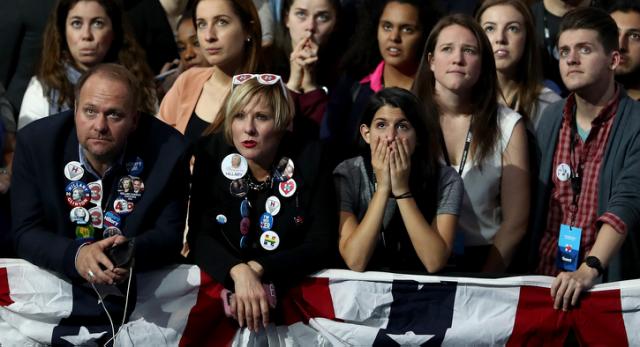
Polls and predictive models failed to predict Trump’s strength.
Everybody was wrong. Again. When Election Day dawned, almost all the pollsters, analytics nerds and political insiders in the country had Hillary Clinton waltzing into the White House.
By the time polls had closed nationwide on Tuesday night, those projections had been left in shambles — just like the ones a year ago that all-but ruled out the possibility of Donald Trump winning the Republican Party’s presidential nomination.
Headed into Election Day, polling evangelist Nate Silver’s 538 website put Clinton’s odds at winning the White House at about 72 percent. By midnight, the site had more than flipped its odds making, giving Trump an 84 percent chance of winning.
Trump had notched hugely significant upset victories in Florida, North Carolina and Wisconsin — critical swing states where almost every public poll and most private projections had shown Clinton ahead.
The Republican nominee’s surprisingly strong performance, which left the race on a razor’s edge at the publication of this story, seemed to at least partly validate his claims that many polls “just put out phony numbers.”
And it left pollsters and operatives struggling to explain how everyone had been so far off.
Geoff Garin, a veteran Democratic pollster who worked for the pro-Clinton super PAC Priorities USA, said many surveys had under-sampled non-college-educated whites, a group that Trump appealed to. He also argued there had been on over-emphasis on the belief that the country’s rising demographic diversity would put Clinton over the top.
“There was too great a belief that demographics are destiny, and that demographics would lead to a certain outcome,” he said. “The reality turned out to be much different that.”
“The pollsters have lost a lot of credibility and won’t be believed on anything soon,” said Jonathan Barnett, a Republican National Committeeman from Arkansas who supported Trump. “The way they poll doesn’t work anymore.”
Some pointed to the possibility of “hidden Trump voters,” who were embarrassed to admit even anonymously to pollsters that they planned to support Trump.
“The very premise of polling is based on the idea that voters will be completely honest with total strangers,” said veteran GOP operative Ned Ryun, who runs a grassroots group called American Majority and had announced his intent to run for Republican National Committee chairman if Trump lost.
Others pointed to the surge in momentum Trump received when the FBI announced 11 days before the election that it was reviewing new evidence related to its investigation into the handling of sensitive information by Clinton and her aides at the State Department.
While FBI Director James Comey on Sunday announced the agency had completed its investigation and would not pursue charges.
But operatives on both sides of the aisle agreed the damage was done.
They pointed out that Trump was out-performing projections in states that had minimal early voting, such as New Hampshire, Pennsylvania and Virginia.
“The bad headlines hurt her this past week,” said conservative operative Brendan Steinhauser, a staunch Trump critic. “Trump had the momentum and the enthusiasm at just the right time.”
And the Republican National Committee’s investment over the past three years in its ground game, once regarded as a significant liability, was getting renewed attention as Trump’s electoral vote count mounted.
While Trump’s campaign lacked anywhere close to the field staff and offices maintained Clinton’s operation, the RNC had worked to make up the difference, funding 315 field offices staffed by 6,012 paid employees and fellows.
The “GOP ground game was outstanding,” tweeted RNC chief strategist Sean Spicer.
Robert Blizzard, a veteran Republican pollster who had been an outspoken Trump critic, tweeted “Where the heck is the vaunted Democratic turnout machine? The RNC crushed this.”
Pro-Trump operatives argued that even when some polls hinted at Trump’s strength, it was ignored or explained away by the media and analysts.
“Most of the press and folks in DC were science deniers when it came to this election,” said veteran GOP operative Curt Anderson, an adviser to a pro-Trump super PAC. “Even in the face of polls that showed it very close, they all said that Trump had almost no chance. It was because they couldn’t imagine it happening.”
He added that “they are in a bubble, and that bubble has just been burst.”

Leave a Reply